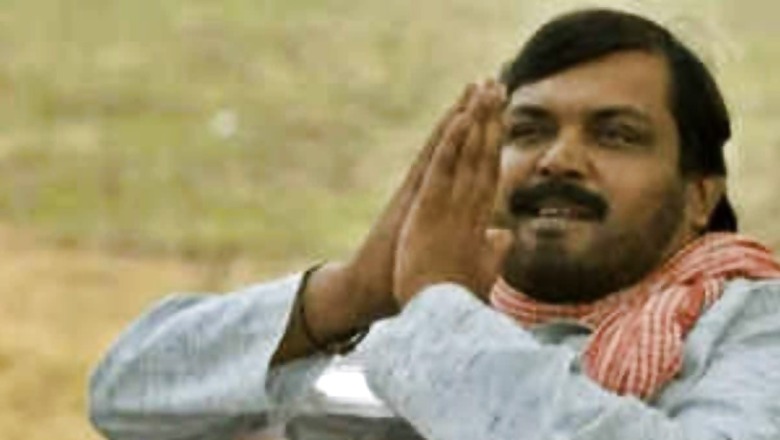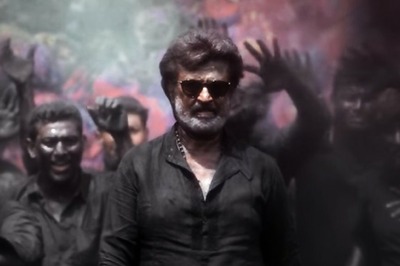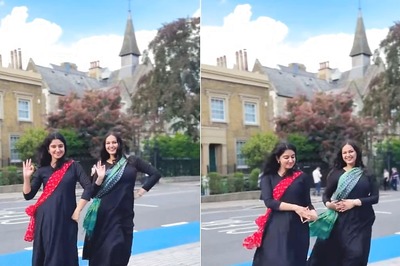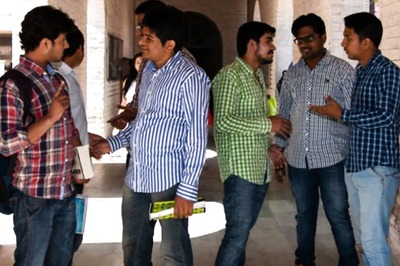
views
If you’ve ever been hooked on the hit series Panchayat, then you’re already familiar with Faisal Malik, the man who brought the lovable and layered character Prahlad Cha to life. But there’s more to Malik than just his small-town charm on screen.
The actor’s road to stardom was anything but a Bollywood fairytale. Picture this: a young Faisal, wide-eyed and 22, arriving in Mumbai with dreams of hitting it big in the film industry. He thought acting would be his golden ticket to easy money—little did he know, the city of dreams had a few reality checks in store.
Sleeping on railway stations? Check. Skipping meals? Double-check. Faisal’s early days were a blur of hardships, but giving up was never an option. Eventually, he landed a gig as an editor at a TV channel, where he started to sharpen his behind-the-scenes skills. Little did he know, this was the first step toward something much bigger.
Enter Anurag Kashyap, the maverick filmmaker who would unknowingly change Faisal’s life. The two met through mutual friends, and before long, they were brainstorming the idea of starting a production company together. The venture didn’t exactly take off as planned, but that wasn’t the end of their story. Fast forward a few years, and Kashyap was knee-deep in casting for his now-iconic film ‘Gangs of Wasseypur’. In true low-budget indie style, everyone from the spotboy to the driver was roped into acting roles, and Faisal found himself playing Inspector Gopal Singh. The rest, as they say, is cinematic history.
But here’s the twist: despite the success of ‘Gangs of Wasseypur’, Faisal wasn’t interested in making acting his full-time gig. He was all set to stay behind the camera, focusing on production, until destiny came knocking once more—this time in the form of ‘Panchayat’. The show’s creators were so impressed by his past work that they convinced him to step into the shoes of Prahlad Pandey. And thank goodness they did, because Faisal’s performance has since become one of the show’s most beloved elements.
Now that ‘Panchayat’ is a bona fide hit, Faisal’s phone won’t stop buzzing with new offers. But our man is playing it cool, careful not to get pigeonholed into one type of role. After two decades of hard work, he’s finally getting the recognition he deserves—but he’s not about to forget where he came from. With one foot in acting and the other firmly planted in production, Faisal is balancing his newfound fame with the passion that started it all.
In a refreshingly candid chat with News18 Showsha, Malik spilled the beans on his involvement with the Chitrashaala Film Festival, his meticulous approach to character development, and the trials and tribulations of digging deep into those emotional layers that make his roles so unforgettable.
Participating in Chitrashaala Film Festival
Q1: What does participating in the Chitrashaala Film Festival mean to you, and what do you hope to achieve through this engagement?
Faisal Malik: The entire idea of the Transform Rural India and Village Square’s Chitrashaala Film Festival is incredibly interesting as it addresses the very important themes of rural crafts and climate change. A lot of hard work has gone into it. When I heard about this initiative and the amount of effort being put into it, it inspired and became a driving force for me to think about how we could create, write, and raise awareness about these issues.
Bridging the Urban-Rural Narrative Gap
Q2: What role do you think film festivals like this play in bridging the gap between urban and rural narratives?
Faisal Malik: It needs to be done on a regular basis. I think every six months, an exercise like this should be undertaken. Disseminating awareness through such interactions is far more effective than just telling people about important issues.”
The Impact of ‘Panchayat’ on Rural Representation
Q3: ‘Panchayat’ has been a major success. How do you feel it has impacted the representation of rural India on mainstream platforms?
Faisal Malik: Rural India is now the driving force of rooted content. You won’t be able to see as many city-driven stories for a very long time. All of us are drawn at some level to rural or small-town living. This relatability will remain for life. After 50 years, when urban areas expand even more, these stories will remind us what life used to be like. It would be like reading a book about the times gone by. People will say, ‘Once upon a time, a certain generation used to live like this.’ Change is happening rapidly and will continue to happen. Thirty years from now, the children who are studying now and have never seen a village in their life will revisit these stories and the kind of films Chitrashaala is showing to learn about the past.
Crafting Authentic Rural Characters
Q4: How do you approach the development of characters like Prahlad Cha, rooted in rural settings, to ensure authenticity and relatability?
Faisal Malik: Relatability comes from the fact that there are people like this in our normal lives. I know many people like that. Some might have been the followers of a politician for 25 years, and even though nothing good has happened to them, they are still happy. They don’t want to give up anything quickly to move forward. Relationships matter a lot in our country. Religion and personal ties create a strong bond among people. That’s what makes us unique as Indians.
Depicting Deep Sorrow: The Emotional Preparation
Q5: Prahlad’s grief is a central aspect of his character. How did you prepare yourself emotionally and mentally to depict such deep sorrow on screen? Is there any personal experience or emotion that you drew upon to bring Prahlad’s character to life?
Faisal Malik: Emoting emerges from different exercises and experiences. Once a script comes, then it becomes clear to me just what to do with it and how to do it. Everything is always different with a new project. There has never been one single method to prepare. The work I do each time is in keeping with the challenge. For instance, I immediately liked this person’s simplicity very much. I know many such people who live this way and are happy with it. The grieving is a part of this character and his life. He has lost his wife and his son, but he endures his pain like a stoic. Don’t we know many people who don’t have their parents or children with them but live on? They don’t sit at home all their lives. They survive.
Prahlad’s Journey and the Added Layer of Grief
Q6: How did you approach Prahlad’s journey from previous seasons to this one, especially with the added layer of grief after losing his son?
Faisal Malik: That character has been written very well. Once you read the script, it is easy to understand what he is going to do and what kind of a man he is because of what has happened to him. Life is a fight for him, and you follow his lead even though sometimes you can’t explain why he reacts in a certain way.
Balancing Contrasting Emotions
Q7: Prahlad’s character shifts from deep sorrow to moments of joy, like laughing at Pradhan ji’s joke. How did you balance these contrasting emotions in your portrayal?
Faisal Malik: It’s a tough balance. It doesn’t feel good to cry and mourn, but it takes an actor a long time to get into that space. I mean, this is not just a normal scene because the preparation itself messes with a person’s mind. You have to sit separately from everyone else and maybe watch them party while you sit quietly reading the script. Once you get into the emotional space of the character, half the battle is won.
Shaping Prahlad’s Character with the Writers
Q8: How closely did you work with the writers to shape Prahlad’s character, especially in scenes that required a deep emotional connection?
Faisal Malik: I worked very closely with the writers. We had many discussions about how to portray Prahlad’s grief and how it affects his behavior. It’s essential to stay true to the character’s essence, and the writers were instrumental in ensuring that Prahlad’s emotional journey was authentic and relatable.”
Pressure and the Fear of Typecasting
Q9: Considering that your character and performance have had a significant impact season after season, did you ever feel the pressure of living up to the audience’s expectations?
Faisal Malik: There is a lot of pressure because you want to continue doing good work. And now that the opportunities coming your way are even better, the pressure also increases. But I believe there should be this kind of pressure in every actor’s life because it motivates us to keep working hard.
Q10: A character like Prahlad, which becomes very popular, can be a double-edged sword for an actor as it often leads to typecasting. This means the audience might only see you in that particular role and resist seeing you in different characters. Do you ever deal with this dilemma or fear? How do you manage it as an actor?
Faisal Malik: Typecasting is always a concern, but I try not to let it limit me. I look for roles that challenge me and allow me to explore different facets of my craft. The key is to keep pushing boundaries and not get too comfortable in one type of role.
Looking Forward: Future Roles
Q11: After playing such an intense and layered character, what kind of roles are you looking forward to that’ll quench your creative hunger?
Faisal Malik: This is not up to me to decide as someone else has to write more diverse and layered characters. Then a director may offer that part to me. When it comes my way, I’ll do it for sure.
—
Faisal Malik’s journey is the stuff of legends—one of grit, determination, and the relentless pursuit of dreams. From the harsh realities of Mumbai’s streets to the glitz of Indian cinema, he’s proven that sometimes the most unlikely paths lead to the most incredible destinations.




















Comments
0 comment